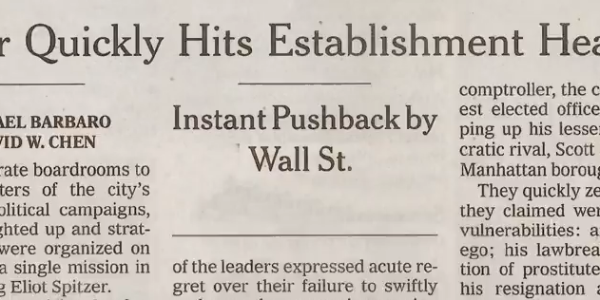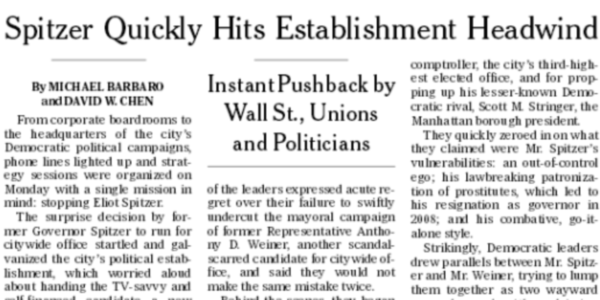Newspaper stories are often used to misleading effect in political ads, but a new one-minute ad from New York City comptroller candidate Eliot Spitzer puts a twist on the theme by actually doctoring a New York Times headline.
At the midpoint in the ad, here’s what you see:
And here’s how it looked when it actually appeared in the New York Times on July 9:
See the difference in the subhead? The original reads, “Instant Pushback by Wall St., Unions and Politicians.” The doctored version in the ad simply reads, “Instant Pushback by Wall St.” (H/T Jim Swift)
As the headlines flash on the screen, Spitzer says, “So if you hear any negative noise out there, and you will, keep in mind where it’s coming from. Maybe being hated by the Wall Street firms is not such a terrible thing.”
It’s a classic case of what those in the Twitterverse call a #humblebrag. In other words, it’s seen as a positive to be “hated” by Wall Street.
So why the doctoring of the headline? One has to assume the campaign was less thrilled about negative reviews of Spitzer from Democratic-aligned unions and Democratic politicians. The New York Times article quotes Democratic leaders, such as City Council Speaker Christine C. Quinn, a Democratic candidate for mayor, and Michael Mulgrew, president of the United Federation of Teachers.
The article quotes Mulgrew as saying, “We’re going to make sure that we do everything in our power to make sure Scott is the next comptroller,” referring to Spitzer’s Democratic rival, Scott Stringer.
We reached out to the Spitzer campaign and received this response in an email from a spokesman: “It’s undisputed that there was instant pushback from Wall St and the establishment to Eliot’s candidacy, as the headline states, because Eliot has spent his career taking on powerful interests on behalf of working families. That’s the story the ad tells and that’s what he’ll do as Comptroller.”
That may be, but the response ignores entirely the issue of digitally altering (or cutting and pasting, or whatever method was used).
We’ve seen distortions of media reports in political ads plenty of times before. Often a campaign will attempt to trade on the credibility of a news organization to bolster its candidate, but fail to disclose that the information used in the ad comes from a partisan source rather than the newspaper itself.
For example, a Mitt Romney campaign ad tried to pass off opinions of a former speechwriter for President George W. Bush as though they were from a newspaper’s reporters or editors. In 2008, an Obama campaign ad gave viewers the impression that the Washington Post had found that Obama’s health care plan would save the “typical family” $2,500. But instead of citing the newspaper, the campaign should have cited itself. The Post article simply reported that “[t]he senator’s aides estimated that his plan would save the average family $2,500 per year.”
We’ve seen cases in which ad-makers have cited a figure as coming from a respected newspaper, but failed to mention that the newspaper was simply reprinting an excerpt from the book of a partisan author. We’ve even seen cases in which an ad shows only part of a headline to mask that the information came from an advocate. But we couldn’t recall an instance in which a headline had actually been altered like this one.
The headline in the Spitzer ad was shown for just a quick second (although the ad also flashes a zoom-in on the doctored subhead). But it is deceptive, plain and simple, and we point it out in hopes that it doesn’t become a growing trend in political advertising.
— Robert Farley

